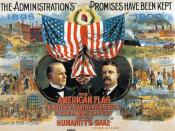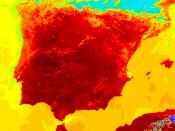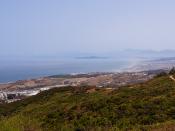In the 1890's the United States became more aggressive and expansionistic than it had been for the past few decades. There was apparently a hunger for foreign conquest. The conflict with Spain derived mainly from the American desire to help the beleaguered Cubans with their independence from Spain. Americans wanted the war, which could well have been avoided, but they had little understanding of what the reults of the war would be. I believe American entry into the Spanish-American war was not justified.
In September, 1895, came the event which changed the course of the Cuban rebellion against Spain. William Randolph Hearst, a young man of 32 who had been operating the San Fransisco Examiner, purchased the New York Morning
Journal, and immediately locked with Joseph Pulitzer and the World in a circulation war that was to make newspaper history. Hearst capitalized on the fact that the American people had only the most romantic notions of the nature
of the Cuban conflict.
American newsmen were filing reports describing the war in terms of nonexistent pitched battles between the liberty-loving Cubans and the cruel Spaniards. The war was presented as a conflict between the forces of
freedom and the forces of tyranny, and the American people ate it up.
The newspapers had influence but they represented no more than a minority of the press of the country. In the South and the Middle West, where the anti-Spanish feeling became most intense, the representative newspaper was much
more conservative. The yellow press played a tremendous part in stirring up sentiment for intervention in Cuba, but these feelings could not be carried into action unless American political leaders of both parties were willing to assume the responsibility of war.
The threat to peace came from the South and West, the strongholds of Democracy...


